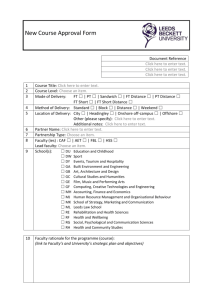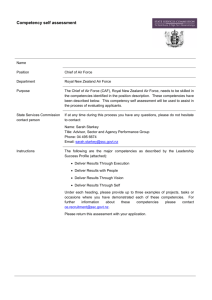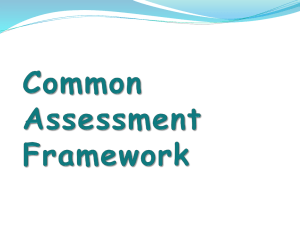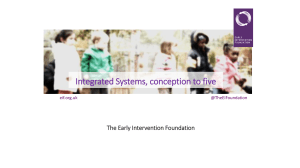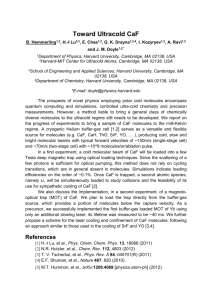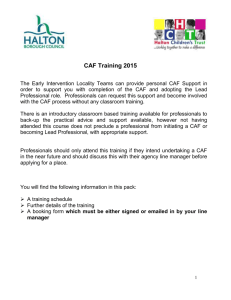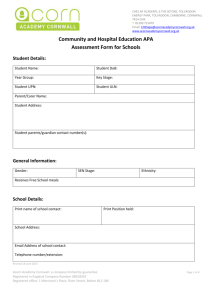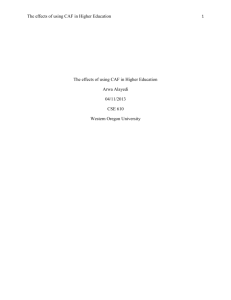CAF regional standards April 2010
advertisement
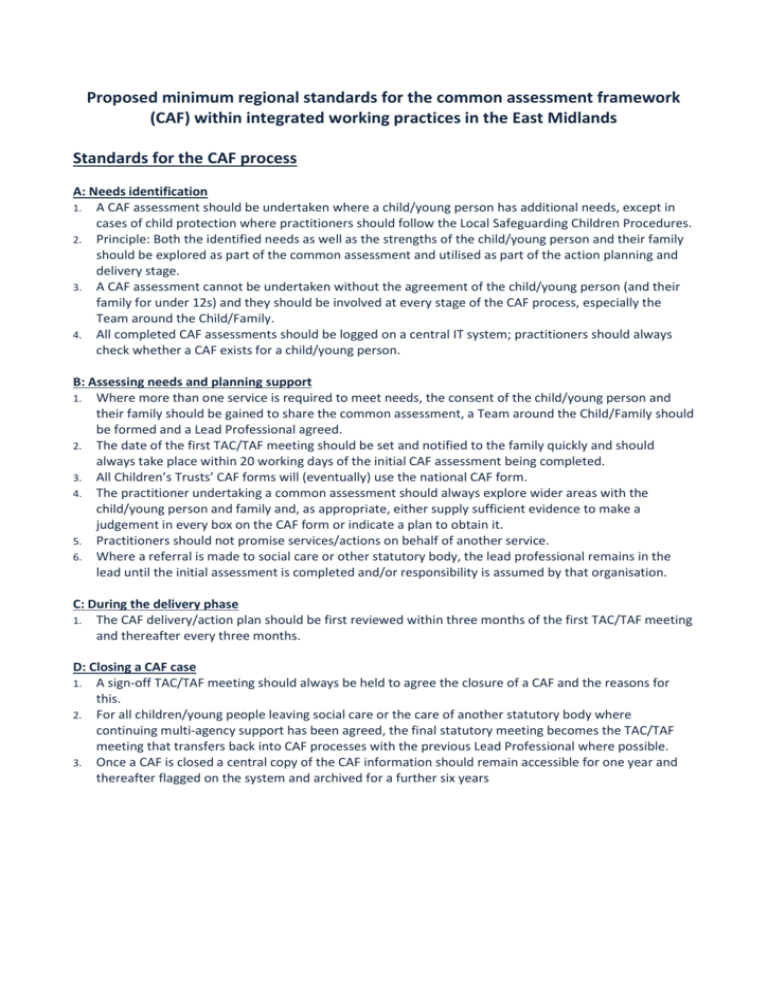
Proposed minimum regional standards for the common assessment framework (CAF) within integrated working practices in the East Midlands Standards for the CAF process A: Needs identification 1. A CAF assessment should be undertaken where a child/young person has additional needs, except in cases of child protection where practitioners should follow the Local Safeguarding Children Procedures. 2. Principle: Both the identified needs as well as the strengths of the child/young person and their family should be explored as part of the common assessment and utilised as part of the action planning and delivery stage. 3. A CAF assessment cannot be undertaken without the agreement of the child/young person (and their family for under 12s) and they should be involved at every stage of the CAF process, especially the Team around the Child/Family. 4. All completed CAF assessments should be logged on a central IT system; practitioners should always check whether a CAF exists for a child/young person. B: Assessing needs and planning support 1. Where more than one service is required to meet needs, the consent of the child/young person and their family should be gained to share the common assessment, a Team around the Child/Family should be formed and a Lead Professional agreed. 2. The date of the first TAC/TAF meeting should be set and notified to the family quickly and should always take place within 20 working days of the initial CAF assessment being completed. 3. All Children’s Trusts’ CAF forms will (eventually) use the national CAF form. 4. The practitioner undertaking a common assessment should always explore wider areas with the child/young person and family and, as appropriate, either supply sufficient evidence to make a judgement in every box on the CAF form or indicate a plan to obtain it. 5. Practitioners should not promise services/actions on behalf of another service. 6. Where a referral is made to social care or other statutory body, the lead professional remains in the lead until the initial assessment is completed and/or responsibility is assumed by that organisation. C: During the delivery phase 1. The CAF delivery/action plan should be first reviewed within three months of the first TAC/TAF meeting and thereafter every three months. D: Closing a CAF case 1. A sign-off TAC/TAF meeting should always be held to agree the closure of a CAF and the reasons for this. 2. For all children/young people leaving social care or the care of another statutory body where continuing multi-agency support has been agreed, the final statutory meeting becomes the TAC/TAF meeting that transfers back into CAF processes with the previous Lead Professional where possible. 3. Once a CAF is closed a central copy of the CAF information should remain accessible for one year and thereafter flagged on the system and archived for a further six years E: Regional standards for CAF Quality Assurance Review processes All Children’s Trusts will ensure that the following themes are embedded within their quality assurance: a. Identifying training needs b. Monitoring CAF processes c. Identifying supervision issues d. Identifying support needs e. Performance management of services f. Effective cross authority working Supervision All practitioners supporting CAFs are entitled to specific feedback and on-the-job support. CAF review should become embedded with ongoing supervision arrangements. Self Review All practitioners will evaluate their effectiveness in each CAF against an agreed regional checklist (still to be developed) Accountability There must be clear lines of accountability within each Children’s Trust organisation to support the Lead Professional when a member of the TAC/TAF does not fulfil their agreed actions on the delivery plan. CAF Data Children’s Trusts will routinely analyse CAF data to identify case characteristics and emerging trends. An agreed minimum common data set will be shared on a regional basis. CAF Audit All Children’s Trusts will audit a proportion of closed CAFs (suggested 1 in 10) for the quality of process and impact on outcomes for children, young people and their families. The Children’s Trust will develop audit processes with partner organisations. Evaluation Children’s Trusts will analyse their CAF Data and CAF Audit information (both above) every three months to ensure implementation of all service improvements, commissioning implications, impact on outcomes, and workforce development measures are addressed. Regional support for quality assurance A regional QA group will review the implementation and effectiveness of these minimum standards and consider the regional implications of each Children’s Trust’s evaluations. A regional toolkit will be developed to provide resources to support all of the above. F: Regional standard for initial training and induction Children’s Trusts will ensure that training is always available in at least the following areas for those requiring it: a. What it means to be part of a Team around the Child b. What is required to undertake a CAF assessment c. What it means to be a Lead Professional d. eCAF where and when applicable e. Information sharing protocols Regional standards for specific aspects of integrated working to support the CAF process above 1. 2. All four stages of the CAF process should always be followed (identify needs early, assess those needs, deliver integrated services and review progress) All agencies working with children, young people and families should share information in accordance with the national Information Sharing Guidance for Managers and Practitioners (Oct 2008).
